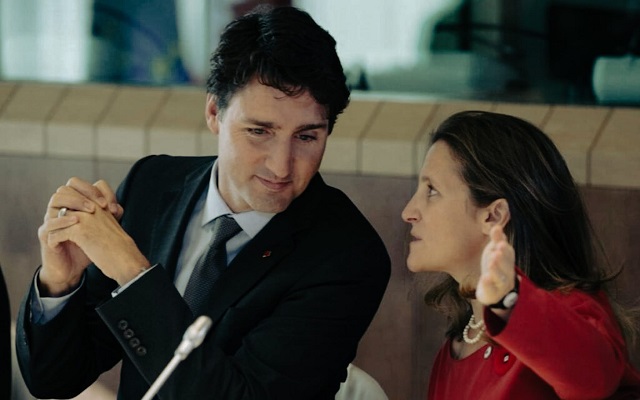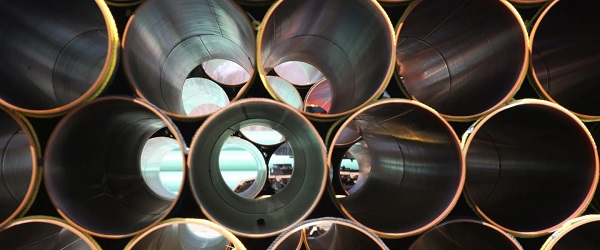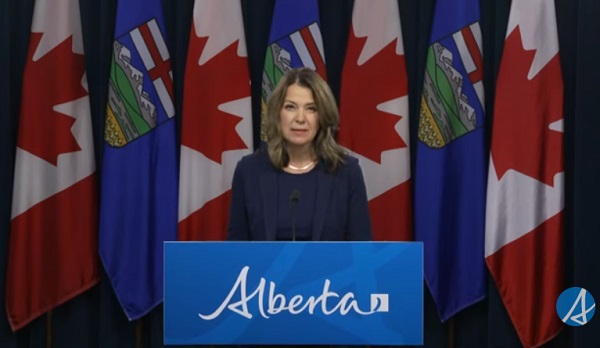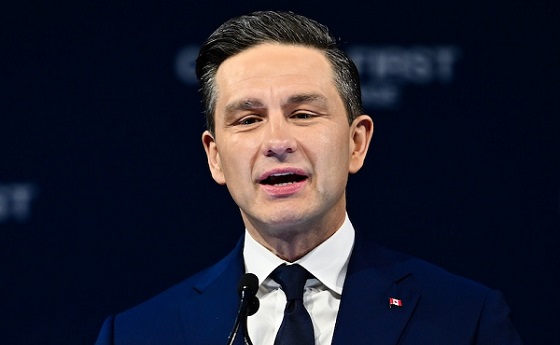Energy
Federal Greenwash law: guilty until proven innocent

From Resource Works
“Under this new law, you’re guilty unless you prove your innocence to some back-room bureaucratic body. That’s simply not a Canadian concept.”
In its latest display of environmental correctness, the federal government passed a new anti-greenwashing law that requires individuals or organizations making claims or promises about the climate benefits of products or processes to prove their truth.
Such “truth,” the law stipulates, must be proven to the satisfaction of a federal bureaucracy — by way of “an adequate and proper test” or “adequate and proper substantiation in accordance with internationally recognized methodology.”
However, those tests and methodologies have not been defined or announced, remaining hopelessly vague. A federal bureaucrat is now empowered under the law to review such climate statements and claims, and to compel court proceedings if they deem them not to meet the ambiguous criteria.
It’s clear the law (Bill C-59, amendments to the Competition Act) would apply to companies claiming, for example, that their production processes or new technologies will reduce greenhouse gas emissions. However, the Competition Bureau conveniently will not have to prove that the claims are false or misleading. The new law instead requires the accused company or agency to prove their innocence.
The penalties can be severe, with fines of up to $10 million ($15 million for repeat offenders) or as much as three times the benefit derived from the misrepresentation. If that benefit cannot be reasonably determined, the penalty could be up to three percent of the company’s annual worldwide gross revenues.
Canada is thus following the green correctness of the European Parliament, which now requires “proof” of claims of a neutral, reduced, or positive impact on the environment when a producer reduces or offsets emissions.
The European Union’s move followed a study by the European Commission, which found more than half of green claims were vague, misleading, or unfounded, with 40% being “completely unsubstantiated.”
Industry in Canada has been quick to protest Bill C-59, and it’s not just the oil and natural gas sector raising concerns. Industries ranging from automotive to mining to manufacturing are also challenging the new law.
Dennis Darby, CEO of the Canadian Manufacturers & Exporters Association, called the changes “quite heavy-handed” and said his member companies worry about potential legal challenges over any environmental claims they make about emissions-reducing technologies.
The Canadian Association of Petroleum Producers (CAPP) also protested: “These amendments effectively silence discussion around climate and environmental policy for political gains, while promoting the voices of those most opposed to Canada’s oil and natural gas sector.
“The federal government’s approach to these amendments has introduced a new level of complexity and risk for those looking to invest in Canada. The amendments to the Competition Act will make it more difficult for proponents to speak to Canadians and gain public support for their projects, particularly for those focused on reducing emissions.”
CAPP argued in a submission to the Competition Bureau: “The effect of this legislation is to silence the energy industry and those that support it, in an effort to clear the field of debate and promote the voices of those most opposed to Canada’s energy industry.
“Implementing a vague law with exceptionally high penalties, without consultation, and with an outsized impact on the country’s largest industries, is both anti-democratic and anti-business.”
Will the new Canadian law also apply (as CAPP says it should) to climate campaigners and green groups who claim that a company, product, or process damages the global climate?
One green group recently attacked liquefied natural gas (LNG) developments in British Columbia using (among other things) a photoshopped image of a smoke-emitting oil and gas facility in Iran. Could that be prosecuted under the new law? It should be, but who knows?
Will the new reverse-onus law apply in practice to government departments, ministries, and ministers? Again, who knows?
The federal Canada Energy Regulator, for example, made a number of green statements in a recent Market Snapshot about LNG in BC:
- “LNG Canada is actively working on electrifying certain processes, especially for the proposed Phase 2. This shift will reduce reliance on fossil fuels and help lower the carbon intensity of LNG production.”
- “Woodfibre LNG will use electric motors powered by renewable electricity from B.C. Hydro, making the project one of the lowest-emission LNG export facilities in the world.”
- “The proposed Cedar LNG facility will also be powered by renewable electricity from B.C. Hydro and will be one of the lowest-emission LNG facilities in the world.”
- “The proposed Ksi Lisims LNG facility would have one of the lowest carbon intensities of large-scale LNG export projects in the world, utilizing several technologies to reduce carbon emissions, including renewable hydropower from the B.C. electricity grid.”
- “The Tilbury LNG facility is powered by renewable hydroelectricity, which means it can produce LNG that is nearly 30 percent less carbon-intensive than the global average.”
Does the Canada Energy Regulator now have to “prove” all those statements?
And what about Prime Minister Trudeau himself? The First Nations LNG Alliance (which has said the law could be used as one more tool to discourage Indigenous partnerships and investment in energy projects) asked if the law would apply to the prime minister.
“Prime Minister Justin Trudeau hailed the go-ahead decision by the Cedar LNG project, majority-owned by the Haisla First Nation in B.C. He said it will be ‘the world’s lowest carbon footprint LNG facility.’ So does the prime minister now have to ‘prove’ that Cedar LNG is the world’s lowest carbon footprint LNG facility?”
Regardless, under this new law, you’re guilty unless you prove your innocence to some back-room bureaucratic body. That’s simply not a Canadian concept, nor a Liberal one. This new law needs to be changed or repealed.
Energy
B.C. premier’s pipeline protestations based in fallacy not fact

From the Fraser Institute
The latest war of words over a pipeline in Canada is between Alberta Premier Danielle Smith, who seeks the construction of a pipeline from Alberta’s oilsands to export facilities on the Pacific coast, and British Columbia Premier David Eby who is foursquare against it.
Smith argues the pipeline is needed to break the U.S. market-lock on Alberta oil, which the United States buys at a discount compared to world prices. Smith argues that increased trade in oil and gas—at higher prices—would be good for Alberta’s economy and Canada’s national economy, and can be done while protecting the environment in both provinces. Eby denies virtually all these claims.
More specifically, Premier Eby makes four arguments against a new pipeline, and all are incorrect.
First, he argues, any pipeline would pose unmitigated risks to B.C.’s coastal environment. But in reality, the data are clear—oil transport off Canada’s coasts is very safe (since the mid-1990s there has not been a single major spill from oil tankers or other vessels in Canadian waters). He also simultaneously argues that it’s pointless to build a new pipeline from Alberta because B.C.’s waters are protected by Bill C-48, the “tanker ban” bill enacted by the Trudeau government in 2017. But in fact, because Bill C-48 only applies to Canadian tankers, a regular stream of oil tankers and large fuel-capacity ships cruise up and down the B.C. coast (between Alaska and other U.S. ports) with stupendous safety records.
Second, Eby argues that B.C.’s First Nations oppose any such pipeline. But in reality, such opposition is quite contingent. The Trans Mountain pipeline expansion project (TMX), which has increased shipping capacity from Alberta to the west coast, has signed agreements with 81 Indigenous community groups (in both provinces) worth $657 million and produced more than $4.8 billion in contracts with Indigenous businesses.
Third, Eby claims that Smith’s proposal is not “real” because no private-sector companies have proposed to build the pipeline. And he’s partly right—no rational investor would look at the regulatory barricade facing pipeline construction and spend the time and money to propose a project. Those applications cost money and lots of it. In 2017, according to TC Energy,before it retracted its Energy East/Eastern proposals due largely to regulatory barriers, the company had spent more than C$1 billion trying to get permits. In a 2016 report, Enbridge listed pre-construction expenditures (which include crafting proposals) of up to US$1.5 billion to build its three proposed pipeline projects. These costs will not have gotten cheaper since then. But even so, the Alberta government’s pipeline proposal has the backing of an advisory group, which includes energy companies Enbridge, Trans Mountain and South Bow—likely because they want to invest in the project after there’s some assurance it will survive the regulatory blockade.
Finally, Eby’s claim that there’s no market demand for new pipelines (which implies there will be no investors) is unsubstantiated. According to S&P Global, Canadian oilsands production will reach a record annual average of 3.5 million barrels of oil per day (b/d) in 2025, five per cent higher than 2024. By 2030, production could top 3.9 million b/d, 500,000 b/d higher than 2024 (although this assumes the federal cap on emissions, imposed by the Trudeau government, does not curtail production as predicted). This profit potential will almost certainly attract investors, if they can overcome the regulatory blockade.
It’s fine, of course, for Premier Eby to look out for the people of B.C. as best he sees fit—that’s his job, after all. But it’s also his job to recognize the limits of his authority. When looking at the TMX project, the Supreme Court of Canada has already ruled that B.C. does not have the authority to block infrastructure of national importance, including pipelines.
But as the saying goes, you’re entitled to your own opinion but not entitled to your own facts. Premier Eby’s objections to another Alberta pipeline are rooted in fallacy, not fact. The Carney government should recognize this fact and decide whether or not another pipeline to B.C. waters is in the “national interest,” which is apparently how you get a permit to build major projects in Canada these days.
Carbon Tax
Back Door Carbon Tax: Goal Of Climate Lawfare Movement To Drive Up Price Of Energy


From the Daily Caller News Foundation
The energy sector has long been a lightning rod for policy battles, but few moments crystallize the tension between environmental activism and economic reality quite like David Bookbinder’s recent admission. A veteran litigator who’s spent years spearheading lawsuits against major oil companies on behalf of Colorado municipalities — including Boulder — Bookbinder let the cat out of the bag during a recent Federalist Society panel.
In an all-too-rare acknowledgement of the lawfare campaign’s real goal, Bookbinder admitted that he views the lawsuits mainly as a proxy for a carbon tax. In other words, the winning or losing of any of the cases is irrelevant; in Bookbinder’s view, the process becomes the punishment as companies and ultimately consumers pay the price for using oil and gas and the industry’s refined products.
“Tort liability is an indirect carbon tax,” Bookbinder stated plainly. “You sue an oil company, an oil company is liable. The oil company then passes that liability on to the people who are buying its products … The people who buy those products are now going to be paying for the cost imposed by those products. … [This is] somewhat of a convoluted way to achieve the goals of a carbon tax.”
Dear Readers:
As a nonprofit, we are dependent on the generosity of our readers.
Please consider making a small donation of any amount here.
Thank you!
The cynicism is so thick you could cut it with a knife.
On one hand, the fact that winning is irrelevant to the plaintiff firms who bring the cases has become obvious over the last two years as case after case has been dismissed by judges in at least ten separate jurisdictions. The fact that almost every case has been dismissed on the same legal grounds only serves to illustrate that reality.
Bookbinder’s frank admission lands with particular force at a pivotal juncture. In late September, the Department of Justice, along with 26 state attorneys general and more than 100 members of Congress, urged the Supreme Court to grant certiorari in one of the few remaining active cases in this lawfare effort, in Boulder, Colorado.
Their briefs contend that allowing these suits to proceed unchecked would “upend the constitutional balance” between federal and state authority, potentially “bankrupt[ing] the U.S. energy sector” by empowering local courts to override national energy policy.
For the companies named in the suits, these cases represent not just a tiresome form of legal Kabuki Theater, but a financial and time sink that cuts profits and inhibits capital investments in more productive enterprises. You know, like producing oil and gas to meet America’s ravenous energy needs in an age of explosive artificial intelligence growth.
“I’d prefer an actual carbon tax, but if we can’t get one of those, and I don’t think anyone on this panel would [dis]agree Congress is likely to take on climate change anytime soon—so this is a rather convoluted way to achieve the goals of a carbon tax,” Bookbinder elaborated in his panel discussion.
John Yoo, the eminent UC Berkeley law professor and former Bush-era official, didn’t hold back in his analysis for National Review. He described the lawfare campaign as a “backdoor” assault on the energy industry, circumventing the federal government’s established role in environmental regulation.
“There are a variety of cities and states that don’t agree with the federal government, and they would like to see the energy companies taxed,” Yoo explained. “Some of them probably like to see them go out of business. Since they can’t persuade through the normal political process of elections and legislation like the rest of the country, they’re using this back door,” he added.
What we see in action here is the fact that, although the climate alarm industry that is largely funded by an array of dark money NGOs and billionaire foundations finds itself on the defensive amid the aggressive policy actions of the Trump 47 administration, it is far from dead. Like the Democrat party in which they play an integral role, the alarmists are fighting the battle in their last bastion of power: The courts.
As long as there are city and county officials willing to play the role of plaintiffs in this long running Kabuki dance, and a Supreme Court unwilling to intercede, no one should doubt that this stealth carbon tax lawfare effort will keep marching right along.
-

 Agriculture1 day ago
Agriculture1 day agoFrom Underdog to Top Broodmare
-

 Health2 days ago
Health2 days agoCanada surrenders control of future health crises to WHO with ‘pandemic agreement’: report
-

 Censorship Industrial Complex2 days ago
Censorship Industrial Complex2 days agoCanada’s justice minister confirms ‘hate crimes’ bill applies to online content
-

 Health1 day ago
Health1 day agoSovereignty at Stake: Why Parliament Must Review Treaties Before They’re Signed
-

 Bruce Dowbiggin2 days ago
Bruce Dowbiggin2 days agoIs The Latest Tiger Woods’ Injury Also A Death Knell For PGA Champions Golf?
-

 Alberta2 days ago
Alberta2 days agoAlberta’s licence plate vote is down to four
-

 Business1 day ago
Business1 day ago$15B and No Guarantees? Stellantis Deal explained by former Conservative Shadow Minister of Innovation, Science and Technology
-

 Alberta20 hours ago
Alberta20 hours agoPremier Smith moves to protect Alberta in International Agreements










